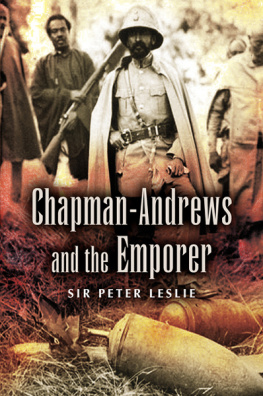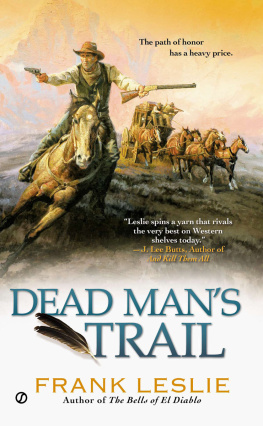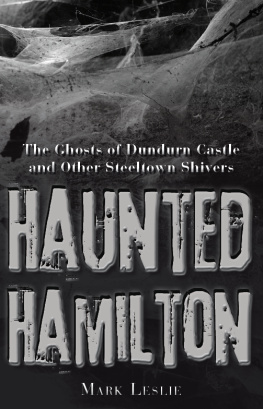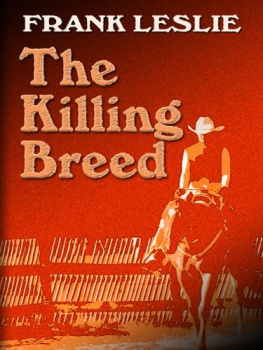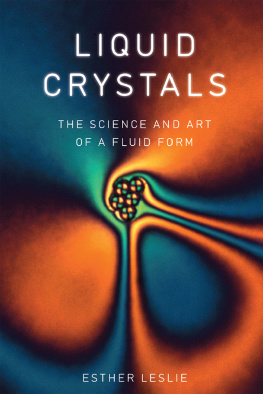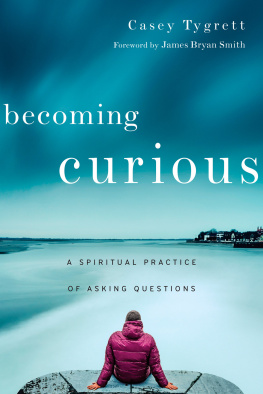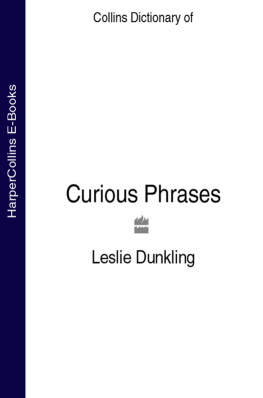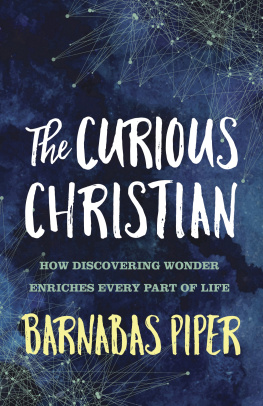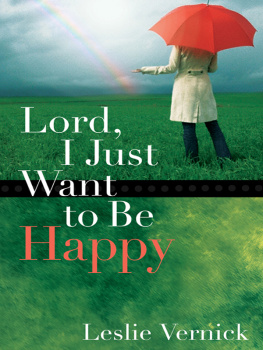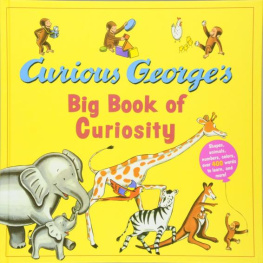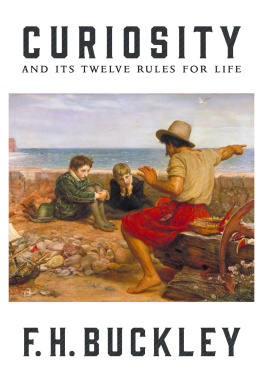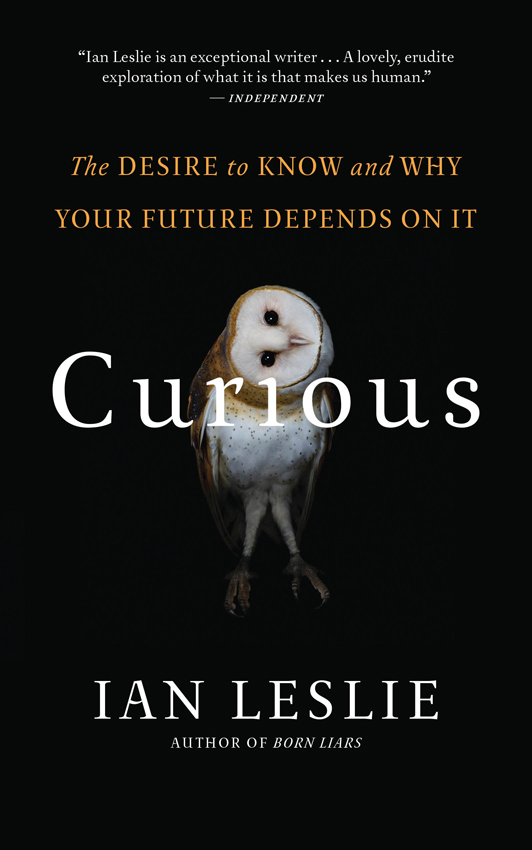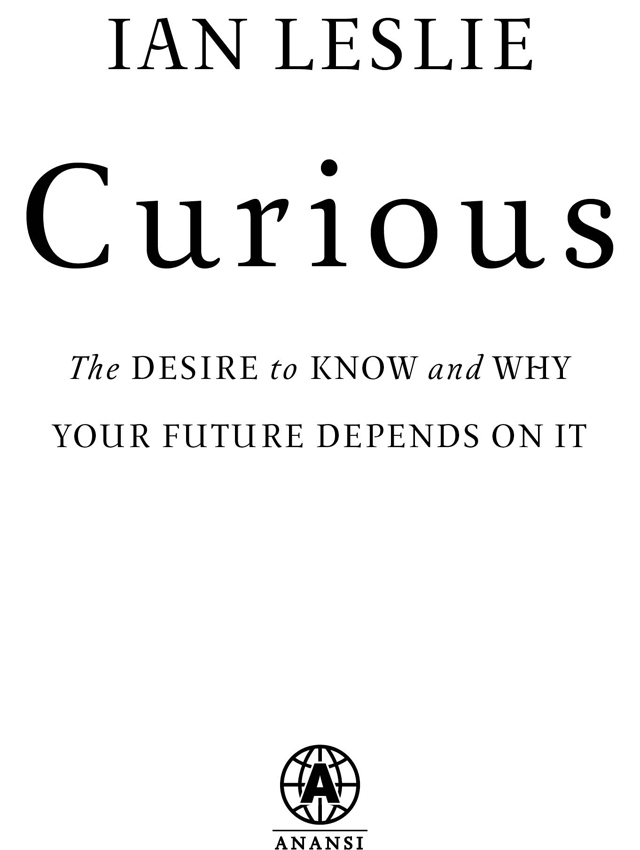Also by Ian Leslie
Born Liars: Why We Cant Live Without Deceit
Copyright 2014 Ian Leslie
All rights reserved. No part of this publication may be reproduced or transmitted in any form or by any means, electronic or mechanical, including photocopying, recording, or any information storage and retrieval system, without permission in writing from the publisher.
Distribution of this electronic edition via the Internet or any other means without the permission of the publisher is illegal. Please do not participate in electronic piracy of copyrighted material; purchase only authorized electronic editions. We appreciate your support of the authors rights.
Published in Great Britain in 2014 by Quercus, 21 Bloomsbury Square, London, WC1A 2NS England.
Library and Archives Canada Cataloguing in Publication
Leslie, Ian, 1972, author
Curious : the desire to know and why your future depends on it / Ian Leslie.
Includes bibliographical references and index.
Issued in print and electronic formats.
ISBN 978-1-77089-403-7 (pbk.).ISBN 978-1-77089-404-4 (html)
1. Curiosity. I. Title.
BF323.C8L48 2014 155.232 C2014-902734-6
C2014-902735-4
Cover design: Nicole Caputo
We acknowledge for their financial support of our publishing program the Canada Council for the Arts, the Ontario Arts Council, and the Government of Canada through the Canada Book Fund.
For Io: may she never stop getting excited by what she doesnt yet know
I have no special talents. I am only passionately curious.
Albert Einstein
I mean that i f it is important for us to eat first of all, it is even more important for us not to waste in the sole concern for eating our simple power of being hungry.
Antonin Artaud
Curiosity is insubordination in its purest form.
Vladimir Nabokov
INTRODUCTION
The Fourth Drive
The researchers first realised that Kanzi was an unusually talented ape when they discovered that he had taught himself language.
Sue Savage-Rumbaugh and her colleagues at the Language Research Center near Atlanta, Georgia, had devoted months of painstaking effort to teaching Kanzis adoptive mother, Matata, how to communicate using symbols. They worked with a keyboard that had lexigrams corresponding to things and actions in the real world; there was a key for apple, another one for play.
Despite being exceptionally intelligent, Matata made slow progress. She understood that the keyboard could be used to communicate, but the idea that specific symbols had specific significance eluded her. She would take Savage-Rumbaughs hand and lead her to the keyboard, intent on sharing what was on her mind. Then Matata would press any key and look up expectantly, as if Savage-Rumbaugh would surely know what she meant. She might press juice when what she really wanted was a banana, or groom when she wanted to go outdoors.
While the researchers were working with Matata, Kanzi was usually in the room, entertaining himself. It had been a condition of Kanzis transfer to the Language Center at six months old that he be allowed to remain with his mother while she participated in language studies. A hyperactive infant, Kanzi darted around the test room, jumping on his mothers head, pushing her hand away from the keyboard just as she was trying to hit a key, stealing the food she earned as a reward for good work.
The researchers had noticed that Kanzi also liked to play with the keyboard when it was free, but they thought little of it. Then one day, when he was two years old, Kanzi went up to the keyboard and very deliberately selected the chase key. He looked at Savage-Rumbaugh to see if she had noticed what hed done. When she nodded and smiled, he ran off, looking behind him as he did so, a big, cheeky grin on his face.
That day, Kanzi used the keyboard 120 times, making requests for specific foods or games, or announcing what he was about to do. To the astonishment of Savage-Rumbaugh and her colleagues, it became clear that he had mastered the symbolic keyboard, despite having never been trained on it, or even seeming to have paid attention to his mothers lessons. Over the following months and years the researchers turned their full attention to this ape prodigy. Kanzi went on to demonstrate linguistic aptitude of such sophistication that he changed the way cognitive psychologists thought about human learning and language.
The difference between an ape and a human being is less than you might think. Kanzi learned a vocabulary of over 200 words. When he was given tests of reading and communications skills he matched, and in some respects excelled, a child of two and a half years old. He made up and follows his own rules of grammar, indicating a creative capacity. He understands spoken language and can follow spoken instructions when Savage-Rumbaugh told him to throw something into the river, he picked up a rock and hurled it in. He can use symbols to ask for treats, or for help opening a door. He loves to play, and he loves to learn.
The story of Kanzi shows just how much we have in common with apes, which ought not to be a surprise, given that we share nearly all of their DNA. Yet it also suggests there is something that isnt shared something very important.
What Kanzi never did, and never does, is ask why . He never furrows his brow, leans over the keyboard and bashes out a sentence like, Why are you asking me all these questions? or What exactly are you trying to discover? He doesnt ask about what lies beyond the confines of his home at the research centre. He can go to the refrigerator, but he has no interest in how the refrigerator works. Although he spends time with human beings who are clearly interested in what it is like to be an ape, Kanzi shows no curiosity about what its like to be human. For that matter, he shows little curiosity in what it means to be an ape. He has never asked, Who am I?
Who am I? was the question to which John Lloyd awoke on the morning of Christmas Eve, 1993. It didnt come to him in the form of a dreamy, philosophical rumination. It was urgent, painful, and insistent. It felt like a drill to the head.
Lloyd hadnt lost his memory. He could answer his question in all the ways you would expect. Im John Lloyd. Im forty-two years old. Im 61. Im a successful TV producer and director. I have homes in London and Oxfordshire. Im married, with three children. But, that morning, none of these answers did anything to salve the pain of the inquiry. The more he thought about it, the more he felt his question pointed not to a loss, but a lack. I realised, he later told me, that I didnt know anything.
Of course, Lloyd did know things. He knew a lot about how to make commercials. He also knew something about how to make TV comedy. During the preceding decade and a half or as he described it to me, fifteen insane years he had gone on an extraordinary, unprecedented hot streak of success, producing some of the most popular and loved comedy shows in Britain, including Not the Nine OClock News , Blackadder and Spitting Image .
Lloyd was instrumental in the early successes of some of Britains most famous actors and comedians, including Rowan Atkinson, Richard Curtis, Stephen Fry and Hugh Laurie. He had won numerous BAFTAs Britains Oscars for those shows, and for his advertising campaigns. In fact, as he told me, with a mixture of pride and sheepishness, Ive won more BAFTAs than anyone except Dame Judi Dench. He was given a Lifetime Achievement Award before he was forty.


